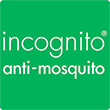 If you are lucky enough to be going away to somewhere hot in the next few months, there will invariably be mosquitoes and other insects present that feed off our blood. There is no need to worry about them provided you C.L.O.A.K!
If you are lucky enough to be going away to somewhere hot in the next few months, there will invariably be mosquitoes and other insects present that feed off our blood. There is no need to worry about them provided you C.L.O.A.K!
C – Cover yourself as much as local conditions necessitate with incognito spray.
L – Light coloured clothing should be worn at all times, as mosquitoes prefer darker colours and can easily “hide” on black.
O – Odors from the body are strong attractants to insects and are known as kairomones. Wash thoroughly to lessen body odor before going out. To be squeaky clean you will need to exfoliate with a loofah – which is why incognito created a loofah soap.
A – Avoid wearing perfumes and scent, as they can attract even more mosquitoes to you and you are attractive enough as it is!
K – Keep away from stagnant water; this is where mosquitoes and other insects reproduce so there are nearly always mosquitoes present.
If you follow the above advice it is highly unlikely that you will get bitten and if you do get the odd bite it is very improbable that you would contract a mosquito-borne disease. There are scare campaigns but out by Glaxo and other pharmaceutical companies that manufacture DEET, that tell you, “It only takes one mosquito bite to catch malaria” – which in theory is true but in practice its not, especially if you are taking anti-malaria tablets. To catch malaria from a single bite whilst taking anti-malarials would be equivalent to winning the lottery!
Just like Cheryl Cole, I was unfortunate to catch malaria whilst taking anti malaria tablets and using a DEET-based mosquito repellent I had brought from Boots (This partly why I got into this business!) however, I was bitten between 5-10 times every day. A big difference! If I had followed the C.L.O.A.K. guidelines I probably wouldn’t have been bitten at all.
I now know that DEET is no longer working effectively as an insect repellent, in fact whole species of mosquitoes have now built up resistance to DEET according to recent scientific findings reported to the National Academy of Sciences https://www.sciencedaily.com/releases/2010/05/100506092733. Around 13% of Aedes aegypti mosquitoes (they bite during the day and can carry dengue and yellow fever amongst others) built up resistance to DEET. It is only a matter of time before most if not all mosquito species build resistance to the over-used pesticide.
Apart from its increasing ineffectiveness DEET is no longer considered safe (many already knew that it was a dangerous substance because of the frequent skin reactions, especially on women and children), by many professionals, since Vincent Corbel proved last year that it was working in the same way as a nerve gas used in chemical warfare! So why do some doctors and nurses still recommend DEET? Its what they were taught, often decades ago and they have yet to be educated about the current research, nor is it a high priority for many of them as there is still no malaria in the UK –although this could easily change with warmer temperatures- there are a number of mosquito species that are capable of transmitting it!
Each year over 2,000 people return to the UK with malaria and thousands more with other insect-borne diseases or complications from insect bites, many of them used a DEET-based repellent and did not have any clue about protecting themselves from insects. However, none of this is an issue if you C.L.O.A.K!
Howard Carter
PS: I will be speaking in the Meet The Experts Theatre on Avoiding Insect Bites at both the Times Destinations Shows in London, Earls Court & Birmingham, NEC –details on the Events Page.
